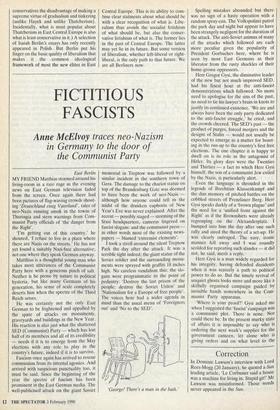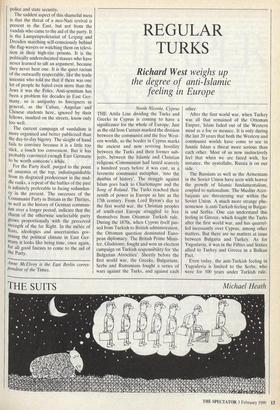FICTITIOUS FASCISTS
Anne MeElvoy traces neo-Nazism
in Germany to the door of the Communist Party
East Berlin MY FRIEND Matthias stormed around his living-room in a rare rage as the evening news on East German television faded from the screen. Once again there had been pictures of flag-waving crowds shout- ing 'Deutschland einig Vaterland', tales of neo-Nazis running amok in the towns of Thuringia and stern warnings from Com- munist Party officials of 'the danger from the Right'.
'I'm getting out of this country,' he shouted, 'I refnse to live in a place where there are Nazis on the streets.' He has not yet found a suitably Nazi-free alternative; not one where they speak German anyway.
Matthias is a thoughtful young man who takes most utterances of the Communist Party here with a generous pinch of salt. Neither is he prone by nature to political hysteria, but like many Germans of his generation, his sense of scale completely deserts him when the spectre of the Third Reich arises.
He was certainly not the only East German to be frightened and appalled by the spate of attacks on monuments, graveyards and buildings in the New Year. His reaction is also just what the shattered SED (Communist) Party — which has lost half of its members and all of its credibility — needs if it is to emerge from the May elections with any role to play in the country's future, indeed if it is to survive. Fascism once again has arrived to rescue communism from its internal agonies. And arrived with suspicious punctuality too, it must be said. Since the beginning of the year the spectre of fascism has been prominent in the East German media. The well-publicised attack on the giant Soviet memorial in Treptow was followed by a similar incident in the southern town of Gera. The damage to the chariot statue on top of the Brandenburg Gate was deemed to have been the work of neo-Nazis — although how anyone could tell in the midst of the drunken euphoria of New Year's Eve was never explained. After the recent — possibly staged — storming of the Stasi headquarters, cameras lingered on fascist slogans: and the communist press — in' other words most of the existing news- papers — blamed 'extremist elements'. I took a stroll around the silent Treptow Park the day after the attack. It was a terrible sight indeed; the giant statue of the Soviet soldier and the surrounding monu- ments were sprayed with graffiti 18 inches high. No careless vandalism this: the slo- gans were programmatic to the point of pedantry: 'Destroy the last prison of the people: destroy the Soviet Union' and 'Nationalism for a Europe of free people'. The voices here had a wider agenda in mind than the usual menu of 'Foreigners out' and 'No to the SED'.
'George! There's a man in the bath.'
Spelling mistakes abounded but there was no sign of a hasty operation with a random spray-can. The Volkspolizei patrol the park day and night but appear to have been strangely negligent for the duration of the attack. The anti-Soviet animus of many of the attacks which followed are each more peculiar given the popularity of President Gorbachev here, where he is seen by most East Germans as their liberator from the rusty shackles of their home-grown oppressors.
Herr Gregor Gysi, the diminutive leader of the new but not much improved SED, had his finest hour at the anti-fascist demonstrations which followed. No more need to apologise for the sins of the past, no need to tie his lawyer's brain in knots to justify its continued existence. 'We are and always have been the only party dedicated to the anti-fascist struggle,' he cried, and the crowds cheered. The SED's past — the product of purges, forced mergers and the designs of Stalin — would not usually be expected to emerge as a matter for boast- ing in the run-up to the country's first free elections. The one chapter it is happy to dwell on is its role as the antagonist of Hitler. Its glory days were the Twenties and Thirties — a fact to which Herr Gysi himself, the son of a communist Jew exiled by the Nazis, is particularly alert.
Even the language is shrouded in the legends of Brechtian Klassenkampf and the dim Memory of pitched battles on the cobbled streets of Prenzlauer Berg. Herr Gysi speaks darkly of a 'brown plague' and the need for a 'unified front against the Right as if the Brownshirts were already regrouping on the AleZanderplatz. bumped into him the day after one such rally and aired the theory of a set-up. He was clearly outraged. The easy, ironic manner fell away and I was roundly scolded for repeating such slander — it did not, he said, merit a reply.
Herr Gysi is a man widely regarded for his integrity, having defended dissidents when it was scarcely a path to political power to do so. But the timely revival of unquiet ghosts looks more and more like a skilfully organised campaign guided by invisible hands somewhere in the Com- munist Party apparatus.
'Where is your proof?' Gysi asked me when I suggested the 'fascist' campaign was a communist plot. There is none. Nor could there be. In the present murky State of affairs it is impossible to say who is ordering the next week's supplies for the government canteen, let alone who is giving orders and on what level to the
police and state security.
The saddest aspect of this shameful mess is that the threat of a neo-Nazi revival is present in the East, but not from the vandals who came to the aid of the party. It is the Lumpenproletariat of Leipzig and Dresden marching self-consciously behind the flag-wavers or watching them on televi- sion in their high-rise prisons. It is the politically undereducated Masses who have never learned to sift an argument, because they never hear one. It is the quiet racism of the outwardly respectable, like the trade unionist who told me that if there was one lot of people he hated even more than the Jews it was the Poles. Anti-semitism has been a problem for decades in East Ger- many, so is antipathy to foreigners in general, as the Cuban, Angolan and Chinese students here, ignored by their fellows, insulted on the streets, know only too well.
The current campaign of vandalism is more organised and better publicised than the day-to-day bigotry. The sleight of hand fails to convince because it is a little too Slick, a touch too convenient. But it has Probably convinced enough East Germans to be worth someone's while.
For the Party itself, purged to the point of anaemia at the top, indistinguishable from its disgraced predecessor in the mid- dle ranks, a repeat of the battles of the past IS infinitely preferable to facing redundan- cy in the present. The successes of the Communist Party in Britain in the Thirties, as well as the history of German commun- ism over a longer period, indicate that the charm of the otherwise unelectable party grows proportionally with the perceived strength of the far Right. In the rnelOe of fears, ideologies and uncertainties gov- erning the political climate in East Ger- many it looks like being time, once again, for all good fascists to come to the aid of the Party.
Anne McElvoy is the East Berlin corres- pondent of the Times.



















































 Previous page
Previous page